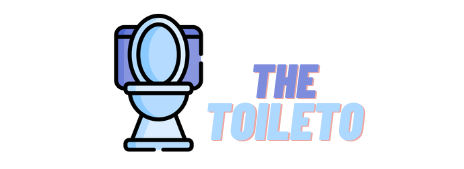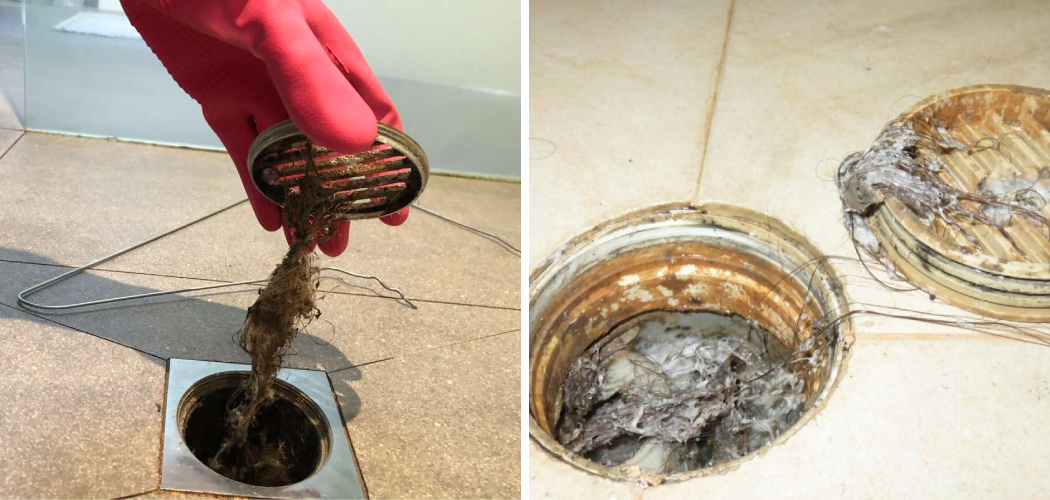Do you ever find yourself standing in the shower, ankle-deep in water because of a clogged drain? It can be so frustrating and inconvenient to deal with! It doesn’t have to be that way though; there are some simple steps you can take to prevent this from happening.
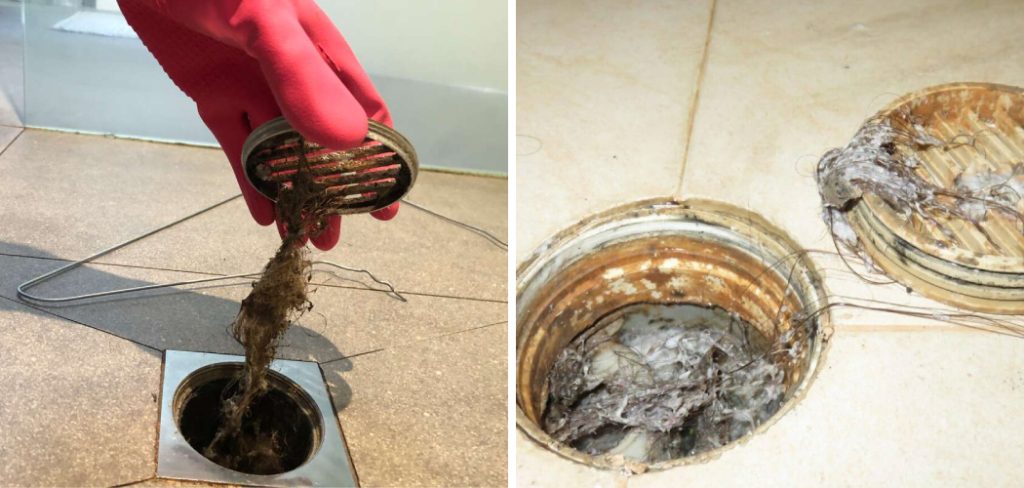
In this blog post, we’ll discuss how to prevent shower drain from clogging with easy tips and tricks and help make sure something like this never happens again! Keep reading for more information about preventing problems like these.
With a few simple tips, you can keep your shower drain unclogged without having to call in a professional or spend money on harsh chemicals. Here we’ll explore how easy it is to clean and prevent clogging in your shower drains while also providing top tips from industry experts on maximizing its effectiveness. Follow along if you want an easier solution for preventing unsightly clogs!
What Clogs Shower Drain?
1 . Hair
The most common cause of clogged drains in the shower is hair. To avoid this, install drain guards and regularly remove lint or hair from them. It’s also a good habit to clean out the drain every few weeks with baking soda and vinegar or an enzyme cleaner.
2 . Soap Scum and Body Oils
Soap scum and body oils can also cause a clogged shower drain. To avoid this, use less soap or switch to liquid soaps and shampoos that won’t leave behind as much buildup. Additionally, you can install a water softener to help remove the soap residue from your shower water.
3 . Minerals
Minerals in hard water can accumulate in your shower drain and cause clogs. To prevent this, you can install a water filter to reduce the amount of minerals in the water.
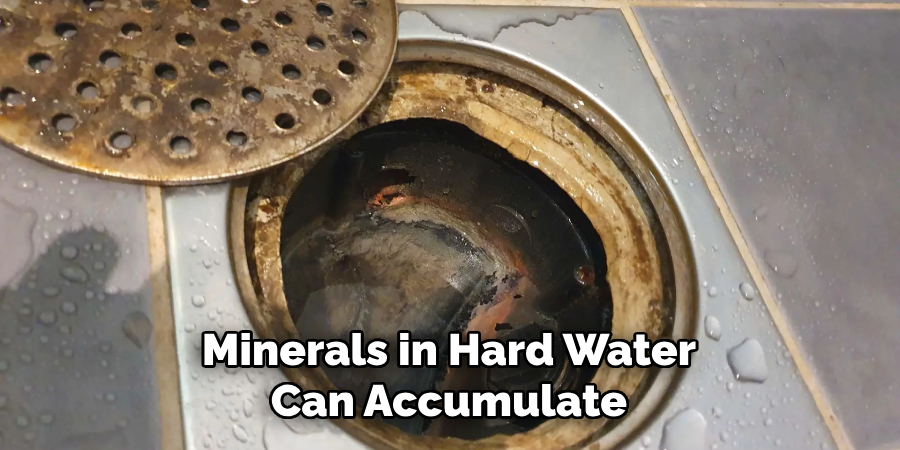
4 . Stray Objects
Stray objects such as toys, jewelry, or other items can also find their way into your shower drain and cause clogs. To avoid this, make sure to keep your showers free from any loose objects.
5 . Wipes, Tissues and Cotton Balls
Wipes, tissues, and cotton balls can also cause a clogged shower drain. To avoid this, never flush these items down the drain and remember to check for them after each use of the shower.
Why is It Important to Prevent Shower Drain From Clogging?
1 . To Avoid Unpleasant Smells
A clogged shower drain can create an unpleasant smell in the bathroom, one that is hard to get rid of. If left for too long, it can spread to other rooms and become a real nuisance. Also, the longer you wait to unclog it, the more difficult it will be to get rid of the smell.
2 . To Prevent Water Damage
A clogged shower drain can lead to water damage in your home due to water being backed up and spilling out onto the bathroom floor. This can cause a costly repair bill if not taken care of quickly.
3 . To Prevent Sewage Backups
A clogged shower drain can lead to sewage backups if the clog is not taken care of in a timely fashion. This can cause serious health concerns and should be addressed immediately if you suspect that your shower drain is clogged.
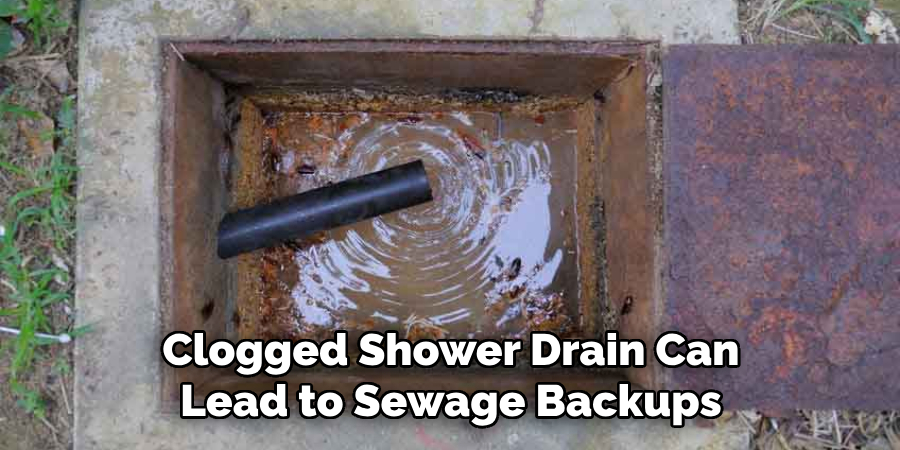
4 . To Lower Your Water Bill
By preventing your shower drain from clogging, you can lower your monthly water bill. A clogged shower drain will cause the water to take longer to drain and will result in more water being used during each shower.
5 . To Promote Proper Drainage
By regularly cleaning and maintaining your shower drain, you can ensure proper drainage of water. This will allow the water to drain freely and quickly while also helping to prevent clogs from forming in the future.
10 Tips on How to Prevent Shower Drain From Clogging
1 . Clean Your Shower Regularly
Regularly cleaning your shower can help to prevent the build-up of soap scum, hair, and other debris that can lead to clogs. Be sure to use a mild cleaner and scrub brush or sponge when cleaning the walls and floor of your shower.
2 . Use a Drain Protector
A drain protector is an effective way to help prevent clogs from forming. Drain protectors are designed to catch hair, soap scum, and other debris before it enters the drainpipe. Be sure to clean the drain protector regularly to ensure that it is working properly.
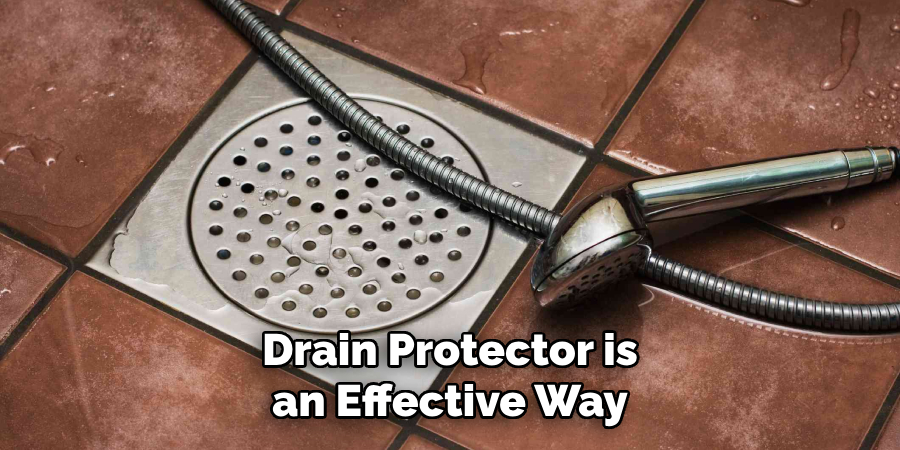
3 . Avoid Using Chemical Cleaners
Chemical cleaners can be corrosive and could damage your shower drain. Instead of chemical cleaners, use a hot water solution of white vinegar and baking soda to remove dirt and soap scum from your shower.
4 . Avoid Pouring Grease Down the Drain
Grease can harden in your pipes and lead to clogs over time. To avoid this, never pour grease down the drain when cleaning up after meals.
5 . Use a Clog Removing Tool
If you find that your shower is beginning to drain slowly, try using a clog removing tool such as a snake or plunger. This can help to dislodge any blockages in the pipes and get things flowing again.
6 . Flush the Drain With Hot Water
If your shower is still not draining properly after using a removal tool, try flushing the drain with hot water. This will help to break up any soap scum and debris that is causing the blockage. Also make sure to run the hot water for a few minutes afterwards.
7 . Install a Water Softener
If you have hard water in your home, it can cause buildup in your pipes and lead to clogs. Installing a water softener can help to prevent this from happening by removing the minerals that are causing the buildup.
8 . Keep Hair Out of the Drain
Hair is one of the most common causes of clogs in shower drains. To help prevent this, make sure to brush your hair before getting in the shower and keep any loose strands out of the drain. Also, make sure to clean the drain of any hair after each shower.
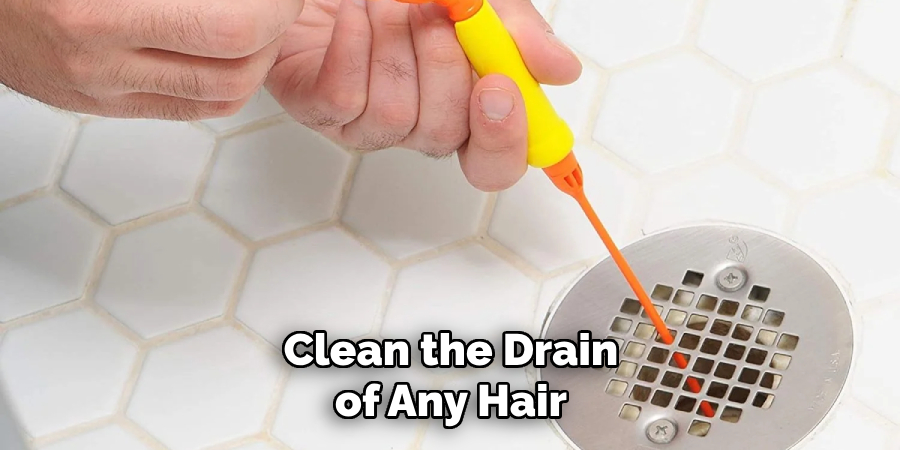
9 . Use a Drain Cleaner Regularly
Using a chemical-based drain cleaner on a regular basis can help to keep your pipes clear and free of clogs. Make sure to follow the manufacturer’s instructions when using this product as they can be toxic if not used correctly.
10 . Schedule Professional Drain Cleaning
If you find that your shower drain is still clogging up regularly or if you are having trouble removing a particularly difficult clog, it may be time to call in a professional. A plumber will be able to assess the issue and make sure that your pipes are in good working order.
By following these tips, you can help to prevent your shower drain from clogging up and keep it flowing freely. However, if you find that you are still having issues with clogs and backups, contact a plumber as soon as possible to have the problem taken care of before any other damage is caused.
Frequently Asked Questions
What Precautions Should I Take to Prevent My Shower Drain from Clogging?
To keep your shower drain from clogging, take the following precautions: Keep soap and hair out of the drain. This will reduce buildup in your pipes and prevent them from clogging. Install a drain cover or strainer that will catch any debris before it can enter the drain. Make sure the strainer is wide enough so that it doesn’t block any water from draining out. Regularly inspect your pipes and drains for any buildup or clogs.
If you do notice a clog, use a plunger or snake to try to remove the blockage before attempting chemical treatments. This will help prevent further damage or corrosion of your plumbing system. Finally, you can also prevent clogs by running hot water down the drain for about 10 minutes once a week to help keep any buildup from forming. Taking these precautions will help you keep your shower drain free and clear of any clogs.
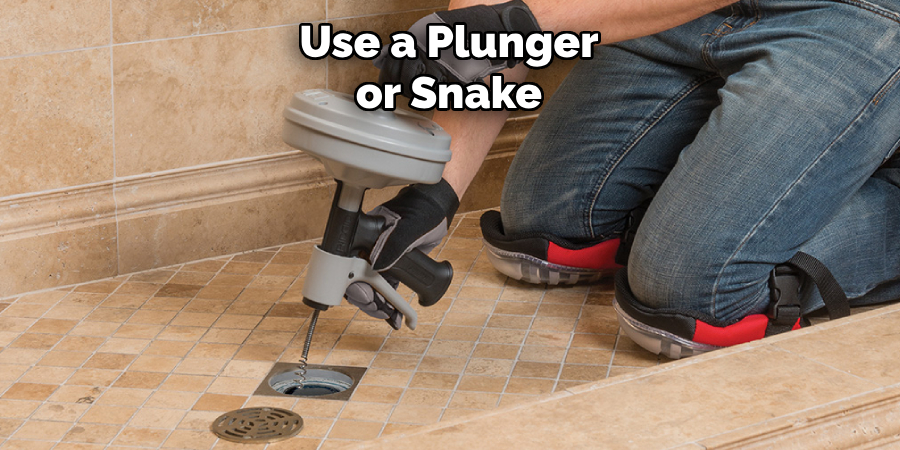
What Causes Shower Drain Clogs?
Shower drain clogs are usually caused by soap scum, hair, oils, and other debris that build up in the pipes. This buildup can eventually lead to blockages or clogs and cause your shower drain to back up. Clogs can also be caused by foreign objects such as small toys or jewelry being washed down the drain accidentally. Additionally, tree roots can sometimes penetrate underground plumbing systems resulting in clogs or leaks.
What Are the Signs of a Clogged Shower Drain?
The most common signs of a clogged shower drain are slow drainage, water backing up out of the shower drain, and an unpleasant smell coming from the drain. If you notice any of these signs, it’s important to address the issue as soon as possible before it becomes a bigger problem.
How Can I Unclog My Shower Drain?
If you suspect your shower drain is clogged, the first step is to try and remove the blockage using a plunger or snake. If these methods don’t work, it may be time to call a plumber for help. They can use specialized tools such as hydro-jetting to clear the clog. Additionally, you can also use a chemical drain cleaner to try and dissolve any buildup that might be causing the blockage.
What Is Hydro-Jetting?
Hydro-jetting is a powerful plumbing tool used to clean and unclog blocked pipes. It works by using high-pressure water jets to scour the pipe walls of any debris or buildup that might be causing the clog. Hydro-jetting is a safe and effective way to clear out blockages in your plumbing system without damaging the pipes.
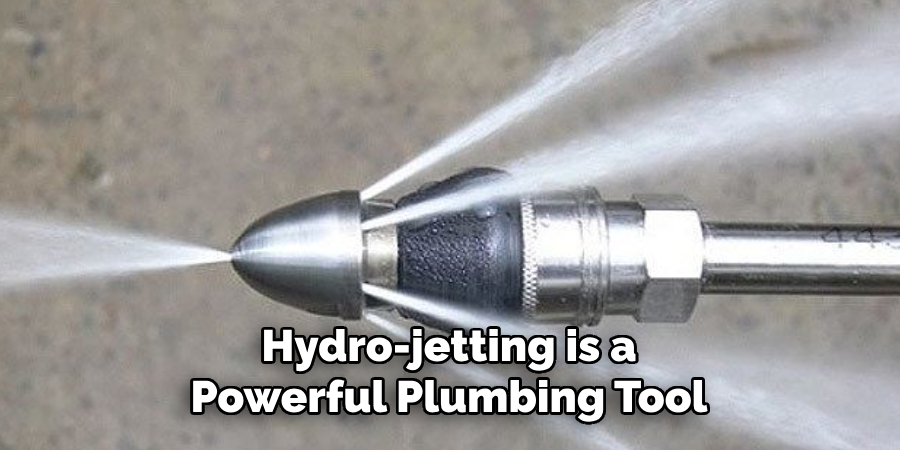
Can I Use Chemical Drain Cleaners to Unclog My Shower Drain?
Chemical drain cleaners can help dissolve any buildup in your shower drain, but they can also be dangerous if used incorrectly. Always follow the directions on the packaging and avoid using too much of the cleaner. Additionally, these chemicals are not recommended for long-term use as they can corrode your pipes over time.
How Can I Maintain My Shower Drain?
One of the best ways to maintain your shower drain is to keep it free of debris. This can be done by using a drain cover or strainer that will catch anything before it goes down the drain. Additionally, running hot water down the drain for about 10 minutes once a week can help prevent clogs from forming. Taking these precautions will reduce the chances of your shower drain clogging and help maintain its overall functionality.
What Are Some Other Tips for Maintaining My Shower Drain?
In addition to keeping your shower drain free of debris, you should also regularly inspect your pipes and drains for any signs of buildup or clogs. You can also occasionally use a plunger or snake to try and remove any blockages before they become a bigger problem. Taking these steps will help you keep your shower drain clean and functioning properly.
Being prepared and taking the necessary precautions can go a long way in preventing clogs from forming in your shower drain. Implementing these tips will help you avoid any plumbing problems and ensure that you stay safe while using your shower. Remember, if you do encounter any problems with your shower drain, contact a plumber right away to help you get it fixed.
Conclusion
Taking the above-mentioned measures to prevent shower drain clogs can go a long way in saving you time, money, and hassle. With diligence and regular maintenance, you can ensure that your shower drain remains clear of obstructions for years to come. Don’t let a clogged shower drain keep you from experiencing an enjoyable hot or cold shower on demand – take these preventative steps today and enjoy clean showers for many years to come!
Now you know how to prevent shower drain from clogging! Remember, taking short preventive actions now can save you much bigger headaches down the line. So don’t hesitate and invest your time now toward giving yourself peace of mind down the line!
